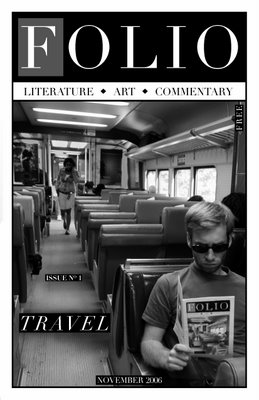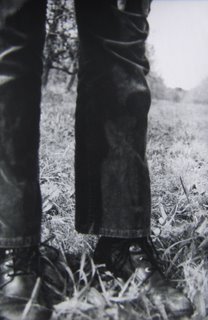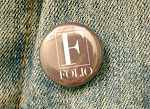
About Me

- Jonathan Tuttle
- FOLIO is a magazine of strange, comic, and strangely comic words and pictures published from 2006 to 2009. For back issues please contact the_folio@hotmail.com.
Issue No. 1, Travel - The Dole by Jonathan Tuttle

The heroes of boy Bevy were the kings of late night comedy. Surely it is they, thought Bevy in Civics, and not the political leaders they ridicule, who do in fact run this country. It is gracious statesman David Letterman who, unlike the object of his wit, at least speaks to us regularly, who lends to his subjects his stentorian voice at the crown of every day. Indeed, of more import to Bevy was not the man who was to fill the next empty White House, but rather the man who was to fill the next empty desk on the next empty oval platform. Bevy drew a line connecting his immediate goal, that of attaining summer employment, with his grander goal and wrote to Mr. Letterman directly. “Dear Mr. Letterman,” he began, “You are a gracious statesman and your stentorian voice crowns my doldrum days. I need a summer job. You need the summer off. I was wondering if you were hiring for the position of host? I can fly up at your earliest convenience. Thank you for considering,” signed, “Bevy.”
A reply was not forthcoming and Bevy fell on a back up plan. He was to produce a daily pamphlet, distributed among the discerning crowds about town, wherein would be typed a list of highlights from the previous night’s shows. Bevy took notes while watching his heroes, jotting down in his reporter’s notebook every set up and punch line he found worthy of print. He typed the jokes first thing in the morning, printed fifty copies, and folded them up. Typed along the top of his pamphlet was a large banner that read, “Funnier Than The Dreams You Were Having – 25 Cents.” He threw the stack into his messenger bag and biked to every social establishment open. Reaching up, Bevy would drop a pile at the end of a bar and tip his hat to the oblivious barman. Bevy did notice the pamphlets were read, or at the very least moved, for he saw them lining the make shift mattress of a panhandler. But the quarters, like Mr. Letterman’s RE, were never received.
Bevy was broke and if he was so much longer he was sure his parents would kick him out; first from the house and then from the tent he would pitch on the front yard. They didn’t want him to turn into his readers, asleep on his papers. Bevy was greatly upset at the prospect as well and looking through newspaper one morning for the classifieds his dread was pushed head long into spleen. A front-page article announced that the city council spent last evening debating the necessity of half the public library research staff. Bevy was good friends with a member of that staff, though the two had never met. He admired from across non-fiction the poise and serenity of the humble sub-sub-librarian, dressed with the aesthetics of a devout ascetic, going about his monastic routine with a perpetual dolphin’s smile. Bevy adored this sub-sub to such an extent he found himself unable to enquire of the librarian a job. And look at him now, the poor librarian, being put to sleep the night prior unawares of which time he should set his alarm clock to: the usual working seven or the now jobless never. The image deeply saddened Bevy.
“Think of it!” he thought to himself, “what it means to be unemployed in this salesmen-sucker society, the brunt of each day spent being sold to by the barrage of surrounding images – the TV commercials and the billboards and these here lingerie photographs in the paper – and what’s left of the day spent spending. It is our ability to spend, that is, the money we have most likely made selling something to someone, that lets us forget, nay, enjoy the pictorial banter of salesmen. Unless, that ability is lacking. Unless, you have no money. Then you are outcast by your own vision, seeing in the iris of every billboard model the imposing reflection of the corporate photographer. Every grinning clerk and rep grins to clench their position between their teeth, knowing full well that if they let slip their piece of American pie they’ll be swept up into that outcast vision with you and me, sub-sub and Bevy in miserable company. Where in this lame brained country is the romance of the unemployed, the romance so espoused by the English working class, as in those black and white movies my mom shows me? Where are those pubs whose business hours are filled with the cheery, ruddy-cheeked likes of those avoiding business? Where are those towns whose factory noon-whistle serves not as a dinner bell but as an industrialized cock-a-doodle-do? Oh, if we but had that drop of vanilla socialism, not large enough to curb our humour but large enough to calm our Coked-up, sales-addled brains into a lush melancholy. Find me a dole line and I’ll extend it by one! Find me a country, though I have one in mind, who appreciates my citizenship enough to see to it I continue to citizen! I’m not asking for a lavish lifestyle. I’m asking for a check. Now! Send me a check!”
The heated passion of these thoughts did not cool in Bevy until eleven thirty postmeridian, when the foreshipmen of late night comedy took the helm. Joke by joke a smile widened across Bevy’s cheeks. He even wrote a few of the jokes down, in spite of the homeless. And then, a joke came along that widened Bevy’s smile to the cracking point. Mr. Letterman was discussing the recent tour the Prince of Wales and his wife, the Duchess of Cornwall, were making across the country. Apparently, the couple had been drawing exceptionally meager crowds, and apathetic ones at that. Mr. Letterman fancied, “In fact, this very night, the two were forced to cocktail alone, playing cribbage at a Best Western in” – crack – Bevy’s hometown.
The laughter after that punch line was great and the applause greater as Bevy was on his bicycle hightailing it to the Best Western. “Typically disrespectful Americans!” Bevy continued as he rode the international thoughts of the afternoon. “To disregard two well-speaking demigods, why it’s abominable! If there’s no one else they’ll at least be me to welcome them to our community, and with fireside chat instead of musket shells!”
Bevy didn’t bother with the bike rack. He crashed into the revolving doors and followed them in. He ran to the lobby. Jumped his eyes from loveseat to settee. No sign of them. He ran to the pool. There was no one in the pool or the hot tub. He ran to the front desk and wailed on that waiting bell like thunder’s crashing cymbals. Out from the office in the back stumbled the bellboy rubbing the sleep out of his eyes. He was Bevy’s age, had Bevy’s sconeish build, even bore Bevy’s near terminal acne. The only real difference between the two was a pair of pressed slacks on one and some cut off cargos on the other.
“The Prince of Wales! The Duchess of Cornwall!” Bevy stopped to catch his breath. “Where are they?”
“They’re still in the restaurant,” said the bellboy. “They were just about to go up.”
Bevy took off in the direction of the bellboy’s pointed finger but stopped short and turned back.
“Could I ask you another question?” he said. “How did you get this job?”
“My dad owns the place,” the bellboy responded.
Bevy said, “Oh,” and he took off running again. But he stopped and turned again to the bellboy.
“You wouldn’t by any chance be hiring would – “
“No.”
Now Bevy was really sprinting, to the restaurant, through the restaurant, kicking every empty chair and table out of his way until he came to the one inhabited corner of the room. Sitting across from one another, each hanging faces long enough to stir their hot toddies with, the Prince and his beloved Duchess looked deeply and silently into the cribbage board between them. Royalty as real as his television heroes, reality as royal as his dreams, they sat finally before him. To speak or to collapse.
“Welcome to America,” he spoke.
After a silence deemed awkward only by Bevy, the Prince eventually turned, mumbled a delicate “Thank you”, and returned to the chewing of his tongue. They were obviously quite depressed.
Bevy spoke again. “Are you enjoying your stay in the States?”
This time it was the Duchess who tilted her head towards Bevy after a semi-awkward silence. “Yes, dear,” she said.
Bevy stepped closer to their table. “Are you two down in the dumps?” he whispered.
“Yes, dear,” repeated the Duchess.
“No one wants to play with us,” mumbled the Prince again, signaling that everything he and his wife would say was to be dipped in a rancid irony.
“Oh come on,” said Bevy. “You know what you two need?”
The Prince made a move on the cribbage board and the Duchess wiped the toddy off her nascent mustache.
“I’ll tell you what you two need,” said Bevy, stepping again closer to the royal table. “You two need a court jester.”
“Charlie had the last one hung,” said the Duchess.
“One Viagra joke is one too many,” said the Prince.
“He was indeed well hung,” said the Duchess.
Bevy tried to laugh. “Dry as their streets are wet, that’s the British wit, or so my mom tells me.”
“Yes, dear.”
Bevy, remembering that employers only respect the bold, took three cribbage pieces off the board and began to juggle. The Prince and Duchess continued playing without notice. Bevy got nervous and dropped a piece in the Prince’s toddy. He took a sip.
“Aw come on guys,” said frustrated Bevy. “You could use the Viagra for your upper lip.”
The Duchess giggled. Bevy pointed to her waning smile and said, “Look! Look! There it is!” The Prince raised an eyebrow. “Sorry your highness,” said Bevy, “but I just can’t stand to see the two of you moping around like this. I have an idea!”
Bevy went to the table beside the royal couple. He removed all of its chairs but one and pushed the table close to the Duchess. He sat at the table, alongside the couple but facing out towards the barren restaurant.
“Ladies and gentlemen,” he said to the empty table and chairs spread out before him, “we have an amazing show here for you tonight. On tonight’s big show, fresh from their tour of our once betrothed nation – the Prince of Wales and the Duchess of Cornwall!” Bevy stood up clapping. “Welcome to the show lovebirds, it’s great to have you here. The both of you look amazing, just amazing. What do you think of America?”
“Daft,” said the Prince.
“Hmm?”
“I’m daft about it.”
Bevy laughed out loud and clapped. “Now, tell us who you’re wearing Mrs. Cornwall.”
“A fox I met in Highgrove gave me this hair shirt. The scarf’s Burberry’s.”
Bevy laughed and clapped. “We have to go to commercial here so sit tight and we’ll be back in a moment with this merry young couple from merry old.” Bevy looked out in front of him. “Are we out? Yes? Ok.” He turned to the Prince and Duchess. “Wonderful job, guys. I think they’re really loving you.”
“Smashing,” the couple said together.
“So what do you think? Are you feeling better? Do I get the job? Can I be your court jester?”
The Prince and Duchess sipped the last of their hot toddies, quietly rose from their seats, and turned from Bevy to walk away.
“Hey! Hey!” said Bevy at his host’s desk. “Where are you going? Don’t you need me? Can’t I come with you?”
Still, the royals walked to the elevator.
Bevy shouted after them, “Now what am I supposed to do?”
The Duchess paused and looked to Bevy as her husband held the elevator door. “Thank you for your hospitality,” she said. “We know our two great nations can sustain each other well into the future with the knowledge of our long lasting friendship.”
And the elevator doors closed on the image of a curt, cupped Princess hand waving.
“Ah hell no,” said Bevy and he ran to the front desk. He swung round the counter and into the office where the bellboy was snoring face down on the desk, Mr. Letterman’s musical guest finishing up on a telly beside the bellboy’s head. One hesitant second passed before Bevy undressed himself, undressed the bellboy, and redressed himself in the bellboys pressed slacks. Bevy flipped through the registry and found the room number of the hotel’s special guests – 401, Economy Suite. On his way to the elevator Bevy poured a drink at the bar and placed it on a tray.
“Room service!” he called after knocking on 401.
The Duchess called back, “It’s unlocked!”
Bevy entered the suite. The bathroom door was closed but he could see the light was on inside. He heard water patting against the tub.
“Did my husband order something?” the duchess shouted from behind the bathroom door. “Just leave it on the nightstand! That’ll do!”
Bevy could see the heaving outline of the aging prince in bed and heard the chatter of the Prince’s grinding teeth. Putting the drink down on the nightstand, Bevy looked over the room and found in the corner, next to the air conditioner, exactly what he had expected to find. He opened the lid of an enormous white trunk, bearing the characters C&C on its sides, and got in it.
As Bevy was slowly lowering the lid, the Duchess shouted again from the tub, “Thank you for your hospitality. We know our two great nations can sus – “
The lid shut. The lock fell.
Bevy’s hometown was not the final stop of the royal tour. From inside the white trunk Bevy had the opportunity to not see a dozen or so other American towns and landscapes before being slid into the cargo hold of the newlywed’s private jet and flown off for the home across the pond. It was hard for Bevy to hold his growing boy’s hunger and he considered escaping on more than one occasion. But holding his thirst made it easy for him to hold his bladder and somewhere over the Sargasso Sea Bevy fully realized the enormity of his journey and he floated into a novice traveler’s ecstasy. Curled fetal-wise over one of the Duchess's favorite ball gowns, Bevy mulled over the first win-win situation he had ever encountered, for life in London is either life as a jester or life on the dole.

Issue No. 1, Travel - Le Tiers-Monde by Andrew Ferris
We travel to India. On a patch of monsoon-cracked concrete along Napier Road, just off one of the major intersections of the old city of Pune, sits a small, grey-haired woman with a round face. She doesn’t have a stand or sign or even a lock-box for the money she collects; laying her goods out on the shady pavement, she tucks the coins she gets right into a fold in her sash. She sells assorted things: candy wrapped in shiny foil, baked snacks, rolls of tangled thread. Items go for 5 or 10 rupees, equivalent to 10 or 20 cents. Her location is hardly ideal: a thoroughfare mostly populated by children walking on their own to school, or rickshaws ferrying their passengers to other parts of town. On a good day, she’ll make 2 or 3 dollars. This woman produces little money and spends little money. Is this the Third World?
In retrospect, one of the blessings of the Cold War was that both of the major powers felt compelled to economically support lesser states in order to maintain power and influence. The American Marshall Plan and the Soviet Council for Mutual Economic Assistance (Comecon) dolled out millions of dollars in aid and infrastructure support to poor and war ravaged countries. However, all this philanthrophy was politically motivated and therefore limited: nearly all the money ended up in the battlegrounds of the Cold War.
Walking a little further down Napier Road, we come to an intersection: telephone booths, internet cafes, and barber shops, line the sidewalks while cows, dogs, and the homeless lie on the sidewalk. Rickshaws and mopeds make way for Land Rovers and Rolls Royces. There is no doubt: money is abound.
Pune, an academic town called the “Oxford of the East,” once small is now burgeoning with a population of nearly 5 million. The growth is due to foreign investment: IT companies and Coca-cola plants employ the youth. But one shouldn’t confuse investment with aid, or cash with infrastructure. The “Developing World” is hard to find, because development takes generations and the pay off is never quick. It happens from the streets up. India, like many Third World localities, is splitting down the middle. Two parallel economies are being formed: one fed from the outside and one sucking on the bottom. The woman selling little for little will spend what little she has on food and shelter. She doesn’t starve, but nor does she save. She exists entirely in a local economy. However, floating inches from her is a global economy that she passes every day but can’t be a part of: an economy that sells cars manufactured in Germany and MP3 players designed in Silicon Valley, all at prices directly commensurate to West because, essentially, it’s the same market as 5th Ave.
There are fewer and fewer geographic places that conform to our vision of the Third World, and what few remain are slowly joining the global economy, but it would certainly be a fallacy to suggest that we are in one united world. The Third World exists in the eyes of the old woman, who can see, but not see into, the First World around her. It’s in the outlook of people who have limited means and limited room for growth.
The gaps growing in Third World countries between local and global economies are deeply problematic and have long term consequences. We should not forget that as the global economy unifies, and as the bottom rises to meet the top, the top must lower itself to the bottom. This will involve not just investment but traumatic sacrifice. Cheap labor may be the beginning of the opening of Third World economies, but competition will follow. Competition not only of individuals or ideas, but of entire systems of value.
In retrospect, one of the blessings of the Cold War was that both of the major powers felt compelled to economically support lesser states in order to maintain power and influence. The American Marshall Plan and the Soviet Council for Mutual Economic Assistance (Comecon) dolled out millions of dollars in aid and infrastructure support to poor and war ravaged countries. However, all this philanthrophy was politically motivated and therefore limited: nearly all the money ended up in the battlegrounds of the Cold War.
Walking a little further down Napier Road, we come to an intersection: telephone booths, internet cafes, and barber shops, line the sidewalks while cows, dogs, and the homeless lie on the sidewalk. Rickshaws and mopeds make way for Land Rovers and Rolls Royces. There is no doubt: money is abound.
Pune, an academic town called the “Oxford of the East,” once small is now burgeoning with a population of nearly 5 million. The growth is due to foreign investment: IT companies and Coca-cola plants employ the youth. But one shouldn’t confuse investment with aid, or cash with infrastructure. The “Developing World” is hard to find, because development takes generations and the pay off is never quick. It happens from the streets up. India, like many Third World localities, is splitting down the middle. Two parallel economies are being formed: one fed from the outside and one sucking on the bottom. The woman selling little for little will spend what little she has on food and shelter. She doesn’t starve, but nor does she save. She exists entirely in a local economy. However, floating inches from her is a global economy that she passes every day but can’t be a part of: an economy that sells cars manufactured in Germany and MP3 players designed in Silicon Valley, all at prices directly commensurate to West because, essentially, it’s the same market as 5th Ave.
There are fewer and fewer geographic places that conform to our vision of the Third World, and what few remain are slowly joining the global economy, but it would certainly be a fallacy to suggest that we are in one united world. The Third World exists in the eyes of the old woman, who can see, but not see into, the First World around her. It’s in the outlook of people who have limited means and limited room for growth.
The gaps growing in Third World countries between local and global economies are deeply problematic and have long term consequences. We should not forget that as the global economy unifies, and as the bottom rises to meet the top, the top must lower itself to the bottom. This will involve not just investment but traumatic sacrifice. Cheap labor may be the beginning of the opening of Third World economies, but competition will follow. Competition not only of individuals or ideas, but of entire systems of value.
Subscribe to:
Comments (Atom)

